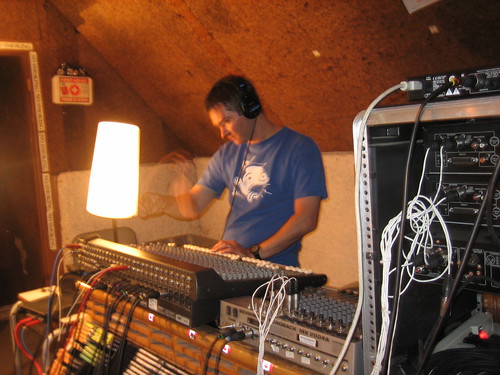Abstract Index Playlist - July 2/08

I took the Abstract Index on the road for the first time last week. It was a fortuitous combination of circumstances that CIUT happened to be broadcasting Harbourfront’s sole Wednesday event of the summer right after my show. And this was no minor event: it was a wildly energetic show by Seun Kuti and Egypt 80, with kora experimentalist Seckou Keita opening up.
Last week was an all-African show – the first one I’d ever done. It was pretty easy to put together. I wouldn’t go so far as to say I’m a “Specialist in All Styles” – I’d leave that description for the following night’s main stage performers, Orchestra Baobab (have I mentioned that Harbourfront rocks?). Still, there are numerous Afro-Canadian discs to choose from, and any number of ways to chart a course through the continent.
Being an Afrobeat-oriented night, I brought a new double disc collection of Fela’s earliest work, from 1963-69. It’s a solid collection, courtesy of those dynamic Spaniards at Vampisoul. The sound quality is variable, although its harsh, lo-fi funk could appeal to certain audiences, if not the dancefloor. The music itself ranges from forgettable to tantalizing. Fela plays trumpet throughout the two discs, and plays well, soloing concisely in contrast to his sprawling saxophone statements of later years. Much of the material before Tony Allen comes along is derivative highlife and jazz, without originality or much spirit in the playing. Once the Allen starts putting some Nigerian Clyde Stubblefield action into Fela’s light jazz, things start to heat up. By the end of disc 2, where his Koola Lobitos band is recorded live at the then-recently established Afro-spot, all the Afrobeat characteristics are in place.
Overall, this is a disc for Fela-philes (and there are many), but the liner notes are excellent. Often, biographies of Fela focus on his time in the USA in 1969 as a key point in the transformation of Afrobeat from party music to political force. These liners concentrate on his formative years in London starting in the late fifties. In particular, the bio paints a picture of yet another above average musician in London trying to hustle work, and getting down at late night jam sessions at the Flamingo Club (with Ginger Baker, who would be an important part of Fela’s life later on). This freelance musical culture would end up being very useful in synthesizing the ingredients that would become Afrobeat later in the decade.
Podcast (three instances of - yikes! - dead air near the beginning as we were getting our s*** together)
Last week was an all-African show – the first one I’d ever done. It was pretty easy to put together. I wouldn’t go so far as to say I’m a “Specialist in All Styles” – I’d leave that description for the following night’s main stage performers, Orchestra Baobab (have I mentioned that Harbourfront rocks?). Still, there are numerous Afro-Canadian discs to choose from, and any number of ways to chart a course through the continent.
Being an Afrobeat-oriented night, I brought a new double disc collection of Fela’s earliest work, from 1963-69. It’s a solid collection, courtesy of those dynamic Spaniards at Vampisoul. The sound quality is variable, although its harsh, lo-fi funk could appeal to certain audiences, if not the dancefloor. The music itself ranges from forgettable to tantalizing. Fela plays trumpet throughout the two discs, and plays well, soloing concisely in contrast to his sprawling saxophone statements of later years. Much of the material before Tony Allen comes along is derivative highlife and jazz, without originality or much spirit in the playing. Once the Allen starts putting some Nigerian Clyde Stubblefield action into Fela’s light jazz, things start to heat up. By the end of disc 2, where his Koola Lobitos band is recorded live at the then-recently established Afro-spot, all the Afrobeat characteristics are in place.
Overall, this is a disc for Fela-philes (and there are many), but the liner notes are excellent. Often, biographies of Fela focus on his time in the USA in 1969 as a key point in the transformation of Afrobeat from party music to political force. These liners concentrate on his formative years in London starting in the late fifties. In particular, the bio paints a picture of yet another above average musician in London trying to hustle work, and getting down at late night jam sessions at the Flamingo Club (with Ginger Baker, who would be an important part of Fela’s life later on). This freelance musical culture would end up being very useful in synthesizing the ingredients that would become Afrobeat later in the decade.
Podcast (three instances of - yikes! - dead air near the beginning as we were getting our s*** together)
Bougouni sou – lipitone rmx. By jeff sharel (frikyiwa)
Segun adewale – segun adewale (rounder)
Oya – lekun babaola (mr. bongo)
Directions in rhythm – rise ashen (no label)
Bouba – kakande (jumbie)
Ade – xalam (syllart)
Love affair – s-job movement (soundway)
Nyirabisabo – mighty popo (tamba)
The bride – brotherhood of breath (arkana)
Thunder in our hearts – jabula (counterpoint)
Shemegi – adam Solomon and tikisa (no label)
Waka waka – fela ransome kuti (vampisoul)
Fire in soweto – steel an skin (be)
African – H20 feat. Subz (out here)
Fanga dem – manjul feat tiken jah (discograph)
Lalogo – alpha blondy (Putumayo)
Labels: playlist, West Africa


0 Comments:
Post a Comment
<< Home